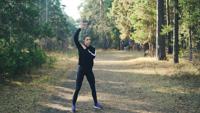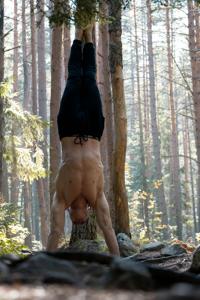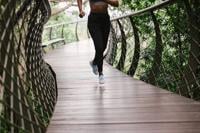
Vitaly Gariev
By Stephen Beech
Exercising in the great outdoors is far more beneficial than working out in the city or at a gym, according to new research.
Getting active in "green" surroundings improves mood, reduces stress levels, and improves heart rate compared to exercising indoors or in urban areas, say scientists.
The study, published in the journal Psychology of Sport and Exercise, showed that one hour of brisk walking in a forest, on a beach, or in a park reduces stress hormones, improves mood, and makes exercise easier to enjoy.
Researchers from the University of Copenhagen, Denmark, and the University of Verona in Italy conducted an experiment involving 25 young men.
The participants had to walk at the same pace in three different environments: a natural area, an urban route, and an indoor fitness environment.
After each walk, their mood, stress levels, and physical exertion were measured - and the results were clear, according to the research team.

(Photo by Sava Savov via Pexels)
Professor Stefano De Dominicis, of the University of Copenhagen, said: “The participants felt significantly more relaxed and had lower levels of the stress hormone cortisol after walking in nature.
"At the same time, they reported greater joy and less fatigue,”
The study is among the first to combine physiological measurements with the participants' own experiences in green, urban, and indoor environments and examine the connection between the two.
De Dominicis said, “It is not new or surprising that nature is good for our health.
"But there has been a lack of research examining both the mental and physical effects of exercise in nature compared to the gym and the city.
"Our study shows that nature is superior to the other two environments in several areas."
He says the study "clearly" illustrates that exercise in nature provides far greater mental benefits than both urban and indoor environments.

(Photo by RF._.studio via Pexels)
Participants rated nature as clearly the most recharging, and they experienced more positive emotions - such as joy, satisfaction, and optimism - than in both urban and indoor environments.
At the same time, negative emotions - including anxiety, irritation, and boredom - were significantly lower in nature. For example, feelings of boredom increased after a walk indoors, while they decreased in nature.
The experience of calm was also highest in nature, while it decreased most indoors.
De Dominicis said: “Humans were born in nature and we have undergone most of our evolution in it.
"Therefore, it is not surprising that we feel good when we are in it.”
The participants also had a "significantly" greater desire to repeat the activity in nature, where the intention to continue was at a completely different level than in the city and indoors.
De Dominicis said: “The figures show that nature not only gives a short-term boost to mood - it also reduces negative feelings and increases motivation to continue being physically active."
He says the physiological measurements supported the participants' experience of exercising in nature.
The research team found that the participants' heart rates dropped more quickly after a walk in nature.

tabitha turner
At the same time, heart rate variability - which shows how well the body activates the parasympathetic nervous system that promotes calm and recovery - was 20% to 30% higher than during the indoor walk.
The researchers emphasized that there are also many benefits to exercising indoors. For example, the social element of playing a team sport or small talk at the gym.
However, Dr. De Dominicis believes that it "makes sense" to incorporate outdoor exercise into weekly exercise programs.
He said: “The mental and physical benefits seem to be significantly greater when exercising in nature, so people can benefit greatly from replacing just one of their weekly indoor workouts with 30 minutes of exercise in green surroundings."
The study also suggests that surroundings play a greater role in our motivation and recovery than previously assumed, as the participants' experience of exercise in the three environments is now backed up by physical measurements.
Dr. De Dominicis added: “We see great potential in using nature as a driving force for physical activity - especially for those who find it difficult to get started."
























(0) comments
Welcome to the discussion.
Log In
Keep it Clean. Please avoid obscene, vulgar, lewd, racist or sexually-oriented language.
PLEASE TURN OFF YOUR CAPS LOCK.
Don't Threaten. Threats of harming another person will not be tolerated.
Be Truthful. Don't knowingly lie about anyone or anything.
Be Nice. No racism, sexism or any sort of -ism that is degrading to another person.
Be Proactive. Use the 'Report' link on each comment to let us know of abusive posts.
Share with Us. We'd love to hear eyewitness accounts, the history behind an article.